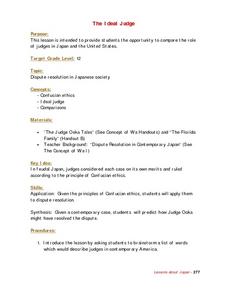Curated OER
Confucianism: A Cornerstone
Studetns comprehend that confucianism is an important underlying philosophy permeating East Asian cultures. They also explore who Confucius was and what he taught, which helps them gain insight into East Asian cultures. Students...
Curated OER
Traditional Values vs. Modern Culture in the Asian Community
Students examine Chinese culture and values. They research the teachings of Confucius, create posters, write short stories, and analyze the history of and present state of gang culture through research, discussion, and writing.
Curated OER
Lesson Overview for Confucian Ideals: "The Analects" and "Miss Li"
Students read and analyze various sayings by Confucius. They view a Powerpoint Presentation, answer discussion questions, complete a translation activity, and write an essay.
Curated OER
Confucius: Words of Wisdom
Students view a documentary on Confucius. He is revered as one of the greatest teachers in history. Confucius' name is synonymous with ageless wisdom. After viewing, students discuss what they saw then complete writing and art activities...
Curated OER
The Ideal Judge
Twelfth graders compare and contrast judges in Japan and United States, read cases from "The Judge Ooka Tales," apply principles of Confucian ethics to dispute resolution, and predict how Japanese judge would rule in contemporary case.
Curated OER
The Chinese Rites Controversy: A Case Study in Cross-Cultural Exchange and Cross-Cultural Conflict
Learners examine the various groups involved in the Rites Controversy of China. They participate in a simulation of representatives involved in the Rites Controversy, conduct research, write a persuasive paper, and participate in a debate.
Curated OER
Exploring the Daoist worldview
Students study the accompanying quotes from the Dao dejing, the Zhuangzi and other Daoist writings. They determine particular implications for knowledge issues and ways of knowing.








